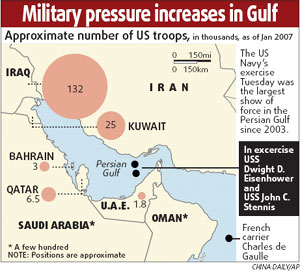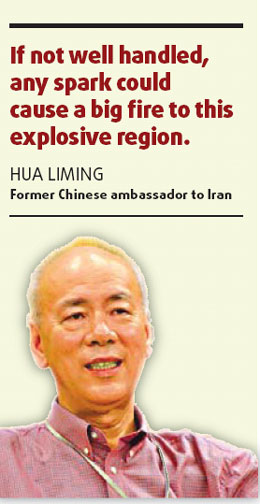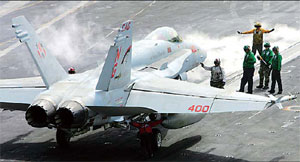An ammunition dump ready to ignite
By Su Qiang (China Daily)Updated: 2007-03-29 06:56
An armed conflict against Iran could develop into a regional war, which would be felt across the entire world, said a Chinese Middle East expert.
With two US aircraft carriers in the Persian Gulf, and the United States and Iran seemingly staging large-scale retaliatory military exercises, the region is becoming an ammunition dump which would only take a spark to ignite, said a Chinese expert on the Middle East.
|
|
"If not well handled, any spark could cause a big fire to this explosive region," said Hua Liming, a former Chinese ambassador to Iran between 1991 and 1995.
On Tuesday, US warplanes took off from two aircraft carriers in the US Navy's largest show of force in the Gulf since the 2003 invasion of Iraq.
The maneuvers, involving 15 American ships and more than 100 aircraft, is sure to exacerbate tensions with Iran, which has frequently condemned the US military presence off its coastline.
The exercises began only four days after Iran captured 15 British soldiers allegedly at the mouth of the Shatt al-Arab waterway, which marks the southern stretch of Iraq's border with Iran.
All these activities remind people of the period just before the United States was about to attack Iraq four years ago," Hua said.
"But even if the military deployment is completed, it is going to be extremely difficult for Washington to decide whether to use these forces."
Bush, along with military officers at the Pentagon, might paint a picture in their minds of overthrowing a hostile regime in the region, but they will have to spend even more time thinking seriously about the consequences once the first cannon is fired, Hua said.
 He noted that Iranian missiles cannot hit the United States,
but they are capable of delivering a decisive blow to US military bases in the
Middle East
He noted that Iranian missiles cannot hit the United States,
but they are capable of delivering a decisive blow to US military bases in the
Middle East
Even days before Saturday's UN vote on a new resolution against Iran, its Supreme Leader Ayatollah Ali Khamenei said in a televised speech his country would respond to any new UN sanctions by all means to defend itself from threats.
"If they take illegal actions, we too can take illegal actions," Khamenei said, without elaborating.
The UN Security Council passed Resolution 1747 unanimously on Saturday, which includes a ban on Iranian arms exports, and the freeze of assets of an additional 28 individuals and entities involved in Iran's nuclear and missile programs.
The resolution was immediately rejected by top Iranian officials, including President Mahmoud Ahmadinejad.
The so-called "illegal actions" mentioned by Iran could involve the blockade of the Strait of Hormuz, the entrance to the Persian Gulf from the Indian Ocean, striking US overseas military bases, or using its influence in the Middle East to fan more hatred in the decades-long confrontation between the Palestinians and Israelis, Hua said.
"It (the war against Iran) could develop into a regional war, which would be felt across the entire world," he said. But the new UN resolution shows that the international community is taking a unified position and have in mind a peaceful way to resolve Iran's nuclear standoff, Hua said.
With 15 nations voting for more sanctions, the new resolution can be considered added diplomatic pressure rather than substantial punishment, he said.
Hua noted there were only 20 months left before Bush's second term ends.
"It is unlikely that the president will launch another war which cannot be finished within his term," Hua said, adding that in American history, no president has ever launched three unfinished wars.
Both the European Union and the United States insist that Teheran stop its nuclear program immediately, but they differ on sanctions, with the EU in favor of a milder form the US stronger.
Their differences in stance is a reflection of their interests in the region. European nations such as Germany, France and Italy have huge economic interests in Iran, especially in energy, and are worried that tougher sanctions or a military attack could hurt their businesses in Iran.
Germany has become Iran's biggest trade partner, while European companies such as Shell, BP and Total will not sit back and watch their interests go up in smoke, Hua said.
The three biggest countries in the EU Germany, France and Britain import most of their oil from Iran and other Middle East countries, he said.
 On the other hand, the United States, after decades of
confrontation with Teheran, does not have any economic presence in the
oil-producing country, and its oil imports from other countries in the region
only accounts for a small portion of its total consumption.
On the other hand, the United States, after decades of
confrontation with Teheran, does not have any economic presence in the
oil-producing country, and its oil imports from other countries in the region
only accounts for a small portion of its total consumption.
Given their huge interests in the Middle East, some European nations have announced they are opposed to any military attack.
Some scars have already been left on relations between the United States and the EU, following the US invasion of Iraq in 2003. Countries such as France and Germany were openly against it.
"If the United States goes it alone again, it would drive another nail in the coffin of the transatlantic relationship," Hua said.
He also compared the Democratic People's Republic of Korea (DPRK) with that of Iran.
Both countries were named "evil" states by US President George W. Bush and targeted as a threat to world peace.
Both countries now mistrust the United States and feel there are being bullied by an unfriendly superpower.
Like the DPRK, Iran also wants to have a guarantee of security from the Untied States, which the White House has refused, Hua said.
Starting from 2003 when Iran and the international community began their long-running negotiations, Teheran, on many occasions, had sent a message to the United States that if Washington could provide the country with a security guarantee and acknowledge its status as a regional power, it would consider a compromise or even drop its nuclear plan.
But Washington does not want to offer such a guarantee to a country, it does not trust, regardless of Iran's influence in the region, Hua said.
|
||
|
||
|
|
